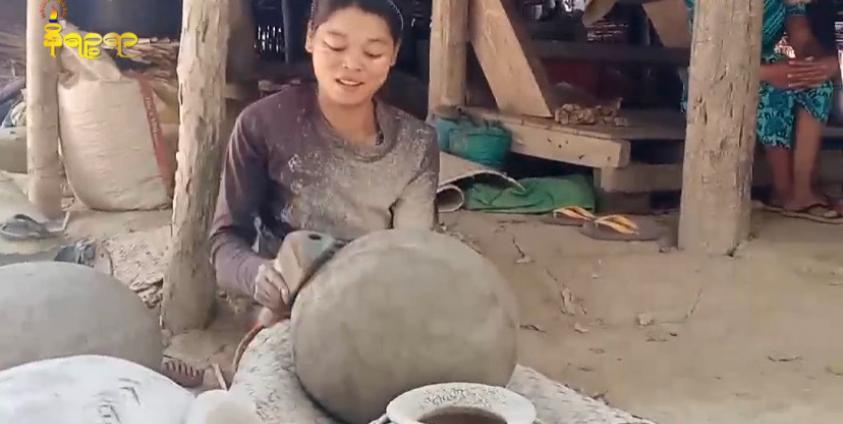Even though there is an increasing demand for Rakhine’s earthenware in the market, the traditional industry may face extinction due to the shortage of skilled labourers, said Daw Mya Than, a potter from Tumyaung village under Kyauktaw township in Rakhine State.
“The traditional trade continues from generation after generation in the entire Rakhine state. Except our Tumyaung village, no localities are now interested in maintaining the pottery business. Now because of the shortage of workers, it becomes very difficult to sustain the
trade,” she added.
Moreover, the relentless political and military crisis in the State have affected public life. Price of various essential commodities is increasing day by day, but the earthenware workers get low wages. It compelled many skilled workers to leave the country looking for a safe livelihood outside.
"The main problem is that there are a few skilled workers. When it became too difficult for them to survive in their villages, many of them left Rakhine to work in China, Thailand, Malaysia, etc. So the market’s demand can not be satisfied with the small volume of workers,” added the lady.
Another problem is that the owners are facing the problem of capital investment to expand the pottery industry.
"Every household can't do the pottery business like before. Some villagers are interested in continuing the trade, but they do not have the needed capital. But we have a lot of buyers from other villages. In earlier days, we used to operate the furnaces every day. However, presently we operate those only once in a month. Since there are no more workers, the number of people working in the business is gradually decreasing,” said Mya Than.

She informed that once every family in Tumyaung village used to make pottery items, but now most of them have now given up the practice.
"We have altogether 130 households in our village and most of them were once associated with the pottery industry. Now only 30 families are practicing it. I do not think the new generation will adopt the profession. So there is a possibility that the traditional pottery industry will extinct soon,” stated the lady.
The traditional Rakhine earthenware is still high in demand across the region, despite increasing use of plastic materials and imports of pottery products.
“The customers come to buy those traditional items regularly. The problem is that there is no enough workers and hence we are producing in less numbers. We are actually unable to meet the demand,” she admitted.
Compared to last year, the demand for traditional Rakhine earthenware such as drinking water-pots, clay cooking-pots, vases, steam pots and stoves continue increasing in the market. Local pottery products have been exported to other regions like Kyauktaw, Mrauk-U, Minbya, Sittwe, Myebon, etc through the facility of warehouses.
A potter from Myebon township, who stopped the pottery business, said that he wanted to continue the traditional pottery business.
“I want to resume the business, but I can't do it alone. It's not the same as having a job or not having one. Even if I am going to start the business again, there is no workforce. Thus a traditional craftsmanship may disappear some days”, he added.
Besides the shortage of workers, the clay and sand required for the pottery are also becoming scarce. Now it is advised that some handicrafts from the national perspective should be preserved so that the future generation can know about the traditional artistic profession.







